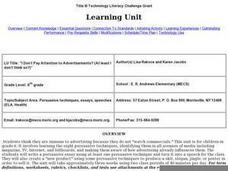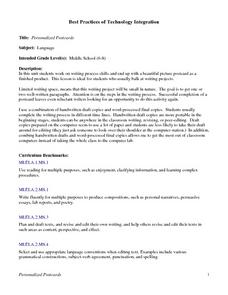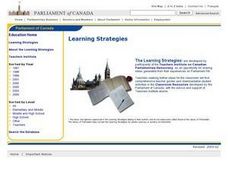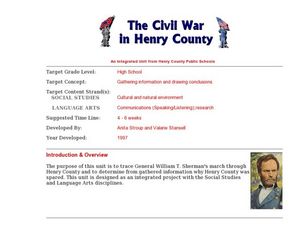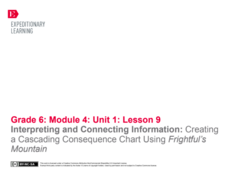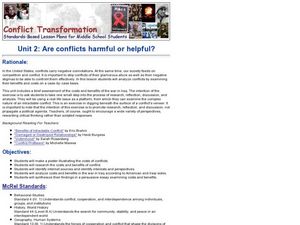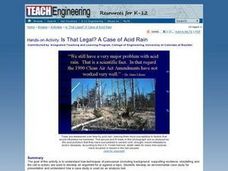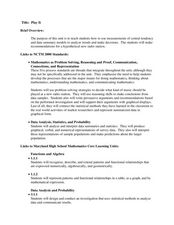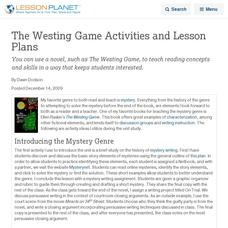Curated OER
Transformations
Young scholars identify the types of transformations in their lives. As a class, they determine the ones they have control over and which ones they do not. They practice solving problems in math and oral communication that they are faced...
Curated OER
Doing What's Right
Young scholars hold a class discussion. In this integrity lesson, students discuss the definition of integrity and read various handouts about what it means to do what's right. Young scholars write a reflection in their journals.
Curated OER
Constitution Week
Students prepare one-minute broadcasts about events leading to the writing of the Constitution and current issues in the next election. Students read their broadcasts on the school P.A. system each morning during Constitution Week.
Museum of Tolerance
Oral History Activity
Oral history has brought a multitude of lessons, stories, and factoids to our current knowledge of the past. Let us continue to use oral history traditions through a lesson that encourages pupils to discover and appreciate...
Curated OER
I Don't Pay Attention to Advertisements
Sixth graders examine the eight persuasive techniques, identifying them in all avenues of media including magazine, TV, Internet, and billboards, and making them aware of how advertising already influences them. They write an essay using...
Curated OER
Personalized Postcards
Students create and send postcards to friends and family members. Using actual photographs, they write a rough draft and final draft of a paragraph and print it out to glue onto a postcard template to mail to their friend or family member.
Curated OER
Smoke and Mirrors
Students develop a persuasive peer-to-peer case against smoking. They read two scenarios, perform a skit, and prepare a factual presentation.
Curated OER
Fiction vs. Nonfiction
Students explore fiction and nonfiction writing. They identify the elements of fiction in a short story and identify the criteria necessary in a nonfiction piece. Students distinguish the author's purpose in an expository text,...
Curated OER
Jim Thorpe: The Greatest Athlete of the Century
Students discuss what makes a sports legend. In this Jim Thorpe activity students analyze both the triumphs and tragedies of Jim Thorpe's sports career. Students then write a letter persuading their representative to name Jim Thorpe the...
Curated OER
One Step Closer to a Treaty
Students speak objectively about the nuclear disarmament issue and interpret sections of the Nuclear Non-Proliferation Treaty. They become more informed by these discussions and readings on the nuclear
Curated OER
It's Debatable!
Students examine the basic elements and vocabulary of debating. They research an issue and write a letter to the editor of the local newspaper, and role-play a Parliamentary debate on a particular bill.
Curated OER
The City Life or the country Life: conventions: Comparative and Superlative Forms of Adjectives and Adverbs
Reinforce knowledge of adjectives and adverbs by game playing. To better understand English conventions young writers, use flashcards to identify the base word and its comparative or superlative form.
Curated OER
History: Impact of the Lewis and Clark Expedition
Students formulate theories about the Lewis and Clark Expedition about its purpose and impact on America. They write position papers supported with facts discovered in their research. Students include quotes, factual references, maps,...
Curated OER
Learning About Asia
Learners study about Asia from class lecture. They study about the continent, the main places in Asia, the products, the climate, and other important facts so they can write an outline for their paper. Students write their outline and...
Curated OER
The Civil War in Henry County
Students consider how the Civil War impacted their community. In this Civil War lesson, students use primary and secondary sources to research the Civil War in Henry County, Georgia. Students use their findings to create multimedia...
Curated OER
Lesson 1: Design a Transportation Stamp
Students, in groups, research a certain form of transportation that has affected Maine's economic and cultural development. They write a persuasive letter that uses the research to support an argument.
EngageNY
Interpreting and Connecting Information: Creating a Cascading Consequence Chart Using Frightful’s Mountain
Decisions, decisions. Scholars take a close look at making decisions by discussing the character Sam in chapters one through eight of Frightful’s Mountain. Partners discuss whether Sam should interact with Frightful and then...
Curated OER
Revisiting Roe v. Wade
Students explore the American anti-abortion movement's "incremental" approach to legislation; they then evaluate key decisions, regulations, and legislation from the landmark 1973 Supreme Court decision, Roe v. Wade, to the present.
Curated OER
Africa Falls Prey to H.I.V.
Students use maps, statistics, and written texts to recognize the H.I.V. explosion in Africa.
Curated OER
Conflict Transformation
Learners analyze the usefulness of conflict. In this conflict resolution lesson, students will examine several real life conflict scenarios. Learners will analyze these conflicts in terms of there costs and benefits to determine weather...
Curated OER
Is That Legal? A Case of Acid Rain
Develop an environmental case study! Elementary learners discover how a case study is used as an analysis tool. The goal of this activity is to show pupils how techniques of persuasion (including background, supporting evidence,...
Curated OER
Play It
There are a number of activities here that look at representing data in different ways. One activity, has young data analysts conduct a class survey regarding a new radio station, summarize a data set, and use central tendencies to...
Curated OER
"The Westing Game" Activities and Lesson Plans
You can use a novel, such as "The Westing Game", to teach reading concepts and skills in a way that keeps students interested.
Curated OER
I Oppose!--Counter-argument/Classifying
Students create an effective classification and counter argument. In this counter-argument lesson, students decide upon a label for at least three types of people and then describe their groups. Students describe three types...






